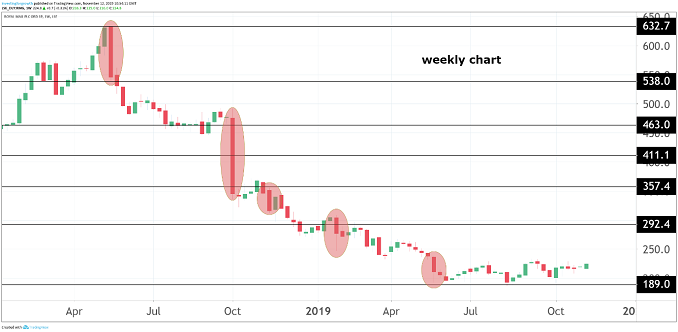Stockwatch: Can Royal Mail shares deliver?
With results due soon, our companies analyst discusses whether or not the shares are worth buying.
12th November 2019 11:05
by Edmond Jackson from interactive investor
With results due soon, our companies analyst discusses whether or not the shares are worth buying.

Can you rely chiefly on financial information to decipher a share's risk/reward profile? Some would say the numbers tell it all, even that you need look no further than the chart.
In which case £2.2 billion Royal Mail (LSE:RMG) is a contrarian buy at 222p currently. Its chart since the 2013 flotation at 330p shows it twice breaching 600p in early 2014 and 2018, then a slump which has appeared to bottom out with a consolidation since last June.
Key financial statistics are a 39% discount to net tangible assets of 361p per share (as of last March), while consensus is for £240 million net profit in the current year to March 2020, rising to over £253 million in 2021, hence a forward price/earnings (PE) ratio of around 9 times.
If realistic, this would provide earnings cover of around 1.45 times for a dividend expected to be cut from a 20p range to about 16.5p albeit still offering a supportive 8.25% yield.
A strong cashflow trend reduced last year, but capital expenditure or debt is not onerous. That 8%-plus dividend yield can be seen as inherently risky but, while brokers' stances vary, Nomura recently targeted 490p.

Source: TradingView Past performance is not a guide to future performance
Industrial action could cause permanent damage
Yet the story includes a first national postal strike in a decade in the run-up to Christmas, which could cause real damage if parcels – key to the company's turnaround strategy – are badly affected.
Royal Mail is seeking to overturn the walkout in a court injunction today, although this relates to balloting procedures. It's a situation of deep industrial unrest versus a relatively new CEO running the business from Zurich on multi-million compensation.
A success in court could prompt some closing of a 6.7% overall short position taken by doubtful investors. But that won't solve the underlying issues of workers saying last year's agreement to reduce the working week has not been respected, and of overall job security.
There's a fear of big job cuts, whether real or imagined: note 5 in the last annual report shows headcount generally higher if down slightly by way of full-time workers in the UK; and margin improvement is a key aspect of Royal Mail's turnaround plan.
A culture of regular sporadic strikes has got going, and the muddle is illustrated by a Union claim that Royal Mail wants to separate its Parcelforce parcels business. Extended delays due to strikes and any other factors (see below) would mean customers changing courier thereby ruining the vision for "parcels-led growth".
| Royal Mail - financial summary | ||||||
|---|---|---|---|---|---|---|
| year end 31 Mar | 2014 | 2015 | 2016 | 2017 | 2018 | 2019 |
| Turnover (£ million) | 9,357 | 9,328 | 9,251 | 9,776 | 10,172 | 10,581 |
| Operating margin (%) | 18.3 | 3.1 | 2.7 | 3.4 | 1.5 | 2.3 |
| Operating profit (£m) | 1,712 | 293 | 251 | 337 | 157 | 239 |
| Net profit (£m) | 1,277 | 325 | 241 | 272 | 259 | 175 |
| IFRS3 earnings/share (p) | 128 | 32.5 | 21.4 | 27.3 | 25.7 | 17.5 |
| Normalised earnings/share (p) | 54.7 | 57.3 | 74.6 | 56.5 | 86.1 | 47.2 |
| Operating cashflow/share (p) | 80.7 | 76.2 | 72.4 | 75.7 | 90.0 | 49.3 |
| Capital expenditure/share (p) | 41.0 | 42.0 | 45.9 | 38.8 | 35.8 | 36.4 |
| Free cashflow/share (p) | 39.7 | 34.2 | 26.5 | 36.8 | 54.2 | 12.9 |
| Dividend/share (p) | 13.3 | 21.0 | 22.1 | 23.0 | 24.0 | 25.0 |
| Covered by earnings (x) | 9.6 | 1.6 | 1.0 | 1.2 | 1.1 | 0.7 |
| Net Debt (£m) | 575 | 295 | 244 | 358 | 6.0 | 320 |
| Net assets per share (p) | 253 | 399 | 446 | 500 | 444 | 462 |
| Source: historic Company REFS and company accounts |
Short-selling: 6.7% of issued shares out on loan
A looming strike is most likely why the overall short position has risen back up to end-2018/early 2019 levels after dropping below 2% mid-year. On 5 November, Pictet Asset Management raised its short position from 0.06% to 1.05%. Any whiff of compromise however could see a rally: the stock doesn't need to satisfy growth criteria, just look undervalued, to prompt short-covering.
I drew attention last January at 280p – albeit as a 'speculative buy' given the chief executive had snapped up £941,000 worth of shares at prices of 318p down to 290p in late 2018.
Maybe it's a lesson not to regard directors' dealings at all decisively. I did caution that "strikes remain a potential long-term risk" and that the situation involved employees accepting changes to their pensions while their shares were falling in value. The new German CEO had received £6 million for being bought out of his contract running GLS, Royal Mail's European parcels business, on top of £2.7 million annual remuneration.
- Time to buy Royal Mail shares?
- Dividend health check: High-yield stocks and problem funds
- Income hunters can find great funds on ii's Super 60 recommended list of investments
I also noted how £4.5 billion net assets include a £2 billion-plus pension fund surplus that is care of trustees. It's justified to price RMG at some extent of net asset value (NAV) discount, and this shows it is vital to consider balance sheets than take your cue from database-driven, quantitative screens.
Furthermore, the current ratio (of current assets to current liabilities) was a weak 0.76, given £1,774 million trade payables versus £1,250 trade receivables. In due respect, over six months to end-March 2019 the current ratio improved to 0.80, within which trade payables reduced 2.3% and receivables rose 12.9%, so is at least moving in the right direction.
So were it not for bad industrial relations, the sense of a turnaround-based 'buy' could have held up. I suspect they will be central to medium-term prospects also. Royal Mail's cash generation is good so long as revenues hold up, but, if not, then a dividend that cost £242 million in the last financial year isn't supported by the £236 million cash position last March, itself down from £600 million in 2018.
Can parcels supply the required revenue boost?
The last annual results showed flat group revenue of around £7.6 billion, as UK parcels/letters offset each other with around 8% growth/decline respectively. Management blamed continuing business uncertainty affecting letters, although steady decline in a digital economy seems endemic. Independent research suggests the number of UK letters will decline by around 26% to 7.6 billion in 2023.
So Royal Mail's turnaround strategy emphasises parcels, where volume growth is targeted above a projected 4-5% growth rate for the UK overall, to achieve a compound annual revenue growth over 5% over five years.
Some 1,400 parcel postboxes are currently being introduced across the UK. The international parcels side - General Logistics Systems or "GLS" – saw 2018/19 revenue rise 8% near £2.9 billion. Its five-year plan aims for improvements in the US, France and Spain which represent 20% of revenue; and, although management doesn't cite Italy, it has appeared historically to constitute about half of revenue.
Interestingly, Royal Mail and GLS are developing a pan-European solution for Asian imports, the Asia-Pacific market being the fastest-growing cross-border e-commerce market globally.
With a more balanced and diversified international business, the group operating margin is targeted to rise to 4% in the next financial year, then to over 5% in 2023/24. Management cites more efficient parcels handling leading to cost reduction and a better "next day" proposition.
My current experience suggests a rather strained operation. A week ago, a Parcelforce 24 Express item was despatched to me, but two delivery attempts failed. Following a complaint, the depot told me the package had split they have been too short-staffed to repackage the item. With due respect, I have had very good swift experience for smaller packages from Europe via GLS. My current experience may reflect inherent risks of online buying, although you wonder how bad things will get in a strike.
Interims and the strike are key, short-term
So, the imminent half-year results to September will confirm whether or not Royal Mail has financial substance to offset a disruptive Christmas. Otherwise, there's a real risk to the turnaround plan and underlying value should industrial conflict fester.
But it puts the stock in focus for alert traders given "steady eddy" numbers plus the prospect of any strike resolution prompting short sellers closing positions. Alternatively, if the situation gets increasingly bitter, then it's not too late to open a fresh short. On an investment view, I do not capitulate to outright 'sell' unless you are risk-averse, but overall currently I rate the shares: Avoid.
Edmond Jackson is a freelance contributor and not a direct employee of interactive investor.
These articles are provided for information purposes only. Occasionally, an opinion about whether to buy or sell a specific investment may be provided by third parties. The content is not intended to be a personal recommendation to buy or sell any financial instrument or product, or to adopt any investment strategy as it is not provided based on an assessment of your investing knowledge and experience, your financial situation or your investment objectives. The value of your investments, and the income derived from them, may go down as well as up. You may not get back all the money that you invest. The investments referred to in this article may not be suitable for all investors, and if in doubt, an investor should seek advice from a qualified investment adviser.
Full performance can be found on the company or index summary page on the interactive investor website. Simply click on the company's or index name highlighted in the article.
Disclosure
We use a combination of fundamental and technical analysis in forming our view as to the valuation and prospects of an investment. Where relevant we have set out those particular matters we think are important in the above article, but further detail can be found here.
Please note that our article on this investment should not be considered to be a regular publication.
Details of all recommendations issued by ii during the previous 12-month period can be found here.
ii adheres to a strict code of conduct. Contributors may hold shares or have other interests in companies included in these portfolios, which could create a conflict of interests. Contributors intending to write about any financial instruments in which they have an interest are required to disclose such interest to ii and in the article itself. ii will at all times consider whether such interest impairs the objectivity of the recommendation.
In addition, individuals involved in the production of investment articles are subject to a personal account dealing restriction, which prevents them from placing a transaction in the specified instrument(s) for a period before and for five working days after such publication. This is to avoid personal interests conflicting with the interests of the recipients of those investment articles.